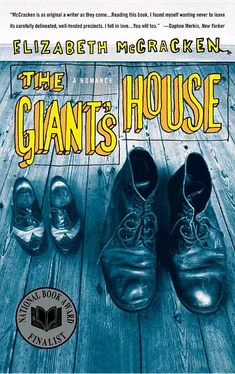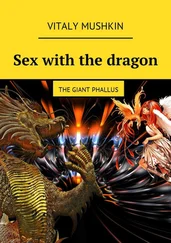“Average height,” said Caroline.
The doctor smiled. “About now, everybody looks tiny to me. So, no history of this sort of size in the family?”
“Not that I know of,” Caroline said. “Not that kind. His grandmother — my mother — was big.”
“How big?”
“Fat,” said Caroline. “Extremely.”
The doctor wrote this down on his pad. “How did she die?”
“In a chair,” said Caroline, smiling almost wickedly. “At night.”
“But what of?”
“Of fat, I always thought. Or Nephritis, that’s a disease, isn’t it?”
“A condition.” The doctor scribbled.
He was more interested in the fat grandmother than in any of the other human frailties — diabetes, heart murmurs, cigar addiction — that Caroline supplied to him. She wanted to tell him about family accidents: the distant cousin who’d lost a finger to a saw (“the little finger of his left hand,” she said, “thank God”); her father’s limp, caused by a boyhood fall and complicated by arthritis.
“Well, that runs in the family,” the doctor said. “Young Jim’s back is somewhat arthritic.”
He was disappointed that we knew nothing of Mrs. Sweatt’s background, but said he’d heard that the doctors in Boston had gathered some of it years before. Myself, I was impressed by Caroline’s knowledge of her family’s bodily quirks. I could not even supply true hair color for any of my relatives.
“Do you think his sense of smell’s normal?” the doctor asked.
“I don’t know,” Caroline said. “I would think so. Peggy?”
“As far as I can tell.”
Finally the doctor capped his pen and straightened his papers. “That should do it, I think. If I have more questions, I’ll call. No doubt talking to the Boston doctors will turn up more.”
“So?” Caroline said.
Dr. Calloway stood up. “Do you have a question, Mrs. Strickland?”
“You examined him. What do you think?”
“I think,” he said carefully, “that he is suffering from giantism. My examination was mostly anthropometric.”
“Anthropometric,” said Caroline.
“I measured him. I’m chiefly interested in his rate of growth, and much of that information I will get in Boston. I’ll examine photographs, X rays, records, et cetera. I came here just to confirm things.”
“But what’s the prognosis ?” Caroline said. “That’s what James invited you here for. He knows he’s tall already. Do you think he’ll be able to lead a normal life?”
Dr. Calloway laughed. It was a dull, clattering sound, as if he were searching his pockets for his smallest loose change. “Has he so far?”
“Yes,” said Caroline. “He has.”
“In that case — if you think living in an oversized garage and painting pictures of oversized furniture is normal, then he is leading and will continue to lead a normal life.”
“What about travel?” I asked.
“What about marriage ?” asked Caroline.
Both the doctor and I looked at her. I didn’t know whether this was a joke, like her grandmother’s death in a chair.
“I wouldn’t rule out careful travel,” he said slowly. “I would rule out marriage.”
“Why?” said Caroline. I looked at her: her face was pale but angry. Maybe she wanted to make him say something so rude she could throw him out, insult him. I knew the feeling. I didn’t want this man to make a clean getaway either.
“Practically speaking? No sexual function. In pituitary giants, that’s to be expected. His genitalia are fully formed, but very small. His testes are descended. Am I being too specific? No? I wouldn’t say that he even thinks about sex. I’m sure he doesn’t miss it.”
“Did you ask him that?” said Caroline.
“I know he likes girls,” I said.
“I’m sure he does,” the doctor said, in a slightly kinder voice. “I never said he didn’t. I just don’t believe he’s interested in them sexually.”
“But you didn’t ask him,” Caroline said.
The doctor picked up his coat and shook some lingering rain out of it; it splattered on the floor. “Mrs. Strickland, I suspect you are a romantic. But as I’m sure your mother told you, romance and sex are not the same thing, now, are they? Some people believe that the secret to a happy life is mind over matter. To my way of thinking, this is backward. It is the body that is stronger than the mind, more determined, and more usually correct. One must trust one’s body. One must not second-guess it. Hypochondria kills more people than cancer. Hypochondria is the result of too much romantic thinking.”
“Romantic thinking runs in the family,” said Caroline. “Bad as arthritis.”
“Well then,” the doctor said. “Perhaps he’ll die of that.” He put on his coat; I could tell by his displeased expression that it was still cold and wet. “That is not a diagnosis, mind you. I am not qualified to diagnose romance.”
“I’m sure you aren’t, Doctor,” said Caroline.
I went back to the cottage once we’d rid ourselves of our unpleasant medical guest. James jumped when I walked in.
“Thought you were that doctor, come back for more,” he said.
“How was your talk?”
James made a face. “Don’t know. He’s nosy.”
“Doctors are.”
“I know doctors, Peggy. I know what kind of questions they normally ask. He’d write something down, and then say, Do you always hold your hands like that? And I’d look at my hands and say, I suppose so, and he’d write something down that was a lot longer than ’patient says, I suppose so,’ so I’d ask him what it was, and he’d just smile. It wasn’t much of a medical examination, I mean, he did a little. Looked me over, felt my stomach, asked me did I think my sense of smell was normal.”
“He asked us that, too. Is it?”
“I think so. Now I’m not so sure. I mean, how would I know?”
“Did he say anything useful?”
“Not really. But he said he’d have an article out about it in six months, maybe. Journal of the American Medical Association . They printed his last one.” He stretched his legs out and regarded them, as if to reassure himself that they were just legs, not hatch-marked and numbered at every unit of measurement. “All he really wanted to do was measure me.”
“Well, you’re expanding your places of publication at any rate,” I said. “Soon I’ll expect you to be on the cover of every magazine in the country.”
“Not if I can help it,” James said.
But the article proved to be one we would not save. “Giantism: Report of a Case” was hateful. I had not known that science could be hateful. It described his impressions of James, though of course his impressions were presented as solid facts. No conclusions, no prognosis; just endless rude sentences about “the schoolboy giant.” James was preacromegalic. That was one medical term. He was also colossal, stupendous, Gargantuan, phenomenal.
Also: slow to respond to questions, introverted, morose, short of attention. His motor coordination is not good, or else he is unduly sloppy by nature. He is careless in his dress. His handwriting is untidy and poorly legible .
“Did he request a writing sample?” I asked James.
“He picked up some notes from my desk. I was tired. I was cold.”
He shows a vapid interest in seeing any memoranda made by a questioner. His sense of position, for his arms, hands, legs, and feet, is very poor .
Dr. Calloway described James physically piece by piece, forehead to nose to ears to feet, not liking a single detail. His fingers are “double jointed,” and they curl themselves up in bizarre positions and assume ungainly and gruesome postures .
Читать дальше












